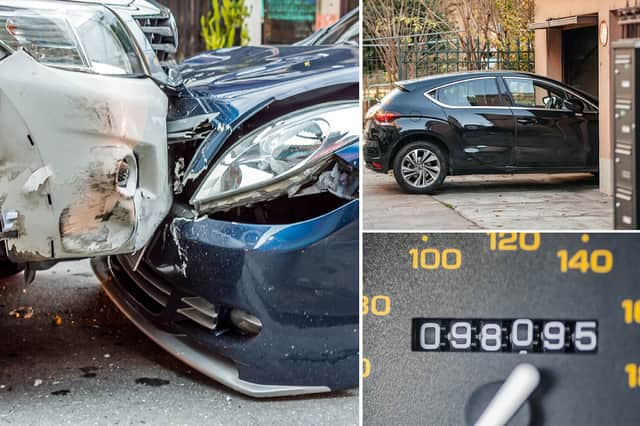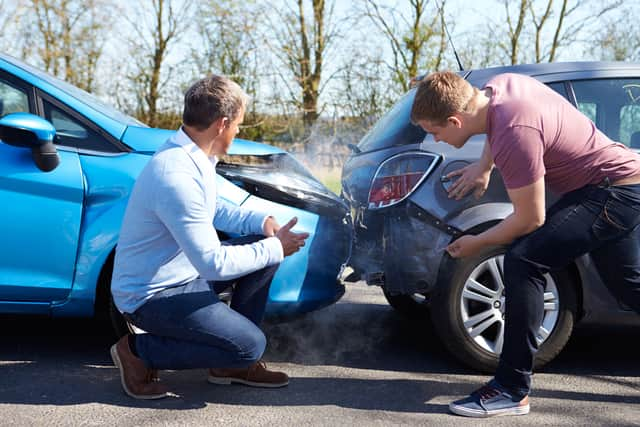What is third party insurance and what are write-off categories? Common car insurance questions answered
and live on Freeview channel 276
Car insurance can be a minefield for drivers - figuring out the correct level of cover, comparing prices and what’s included, and avoiding mistakes or scams that could leave you without protection.
It’s clear that many drivers find the subject confusing and new research shows that every year UK drivers carry out almost half a million web searches for answers to key car insurance questions that can affect their premium prices, payouts and cover.
Advertisement
Hide AdAdvertisement
Hide AdAnalysis of search data by comparison service USwitch shows that every year more than 100,000 people look for an explanation on what a third party policy means while there are around 85,000 searches each on topics involving write-offs and voluntary excesses.
To help clear up any confusion, we’ve answered some of the most searched for car insurance questions with some help from Uswitch’s car insurance expert Leoni Moninska.


What is covered by third party insurance?
Third party insurance was the most searched for insurance topic in the last 12 months according to the Uswitch analysis, with the question “what is covered by third party insurance?" the single most common question.
It’s a fair question, after all, it’s important to know exactly what protection different policies offer. Uswitch car insurance expert, Leoni Moninska, explains: “Third party cover means that if you get into an accident that was your fault, your insurance company will not pay for any damages to your own vehicle, and instead will only pay to cover damages to a third party vehicle or property. This is the minimum level of cover needed to drive legally in the UK.
Advertisement
Hide AdAdvertisement
Hide Ad“Third party, fire and theft insurance is very similar, but in the case of fire damage or theft of your vehicle, you will be covered.
“As this is low-level cover, you may assume that this is the cheapest insurance, but this is not always the case. Typically, ‘high-risk’ drivers - such as new licence holders - used third party cover to get cheap insurance. As a result of this, insurance companies may now set higher prices for third party insurance than fully comprehensive cover.”


Write off categories
The car write off process is the second most searched topic among UK motorists. Out of 85,320 total searches, there were 50,880 searches for questions around "What are the car insurance write off categories?".
On average, insurers write off a car every 90 seconds, but there are different categories governing the process and indicating whether a car can be returned to the road or not. Everything from user safety to the cost of repairs is considered in setting these categories, as Moninska explains:
Advertisement
Hide AdAdvertisement
Hide Ad“The Salvage Code, which breaks down levels of damage into categories, is produced by the Association of British Insurers (ABI) and was most recently updated in 2017. This update is important to take note of; our search data shows that many drivers are looking for information on categories C and D, but these were removed in the update.
“The car insurance write off categories are now broken down into the following:
- Category A: Easily remembered as ‘scrap’, this means your vehicle is so badly damaged it cannot be repaired, and must be disposed of entirely.
- Category B: Meaning ‘break’, a vehicle under this category has been extensively damaged and is no longer roadworthy. The body shell of the car must be crushed, but some parts may be salvageable to use in other cars.
- Category N: Non-structurally damaged repairable, meaning the vehicle will not have sustained structural damage. Instead the car may have a cosmetic or safety feature issue. For it to have been a write off there will have been a problem that the insurance company deemed uneconomical to repair.
- Category S: Structurally damaged repairable, this means the vehicle has suffered structural damage, such as a crumple zone that has collapsed in a crash. However, the insurer has decided not to repair the vehicle.
“In categories N and S, once the insurance claims process is complete, you may choose to keep the vehicle. Once you have bought the car back from your insurer, you must have it professionally repaired to roadworthy condition, and you must take out a new insurance policy. Though be aware that not all insurers will cover formerly written off vehicles, so you may end up spending more.”
What is voluntary excess?
Understanding voluntary excess comes in third place, with 84,720 related questions asked around the topic each year. Unsurprisingly, “What is voluntary excess?”, is the most commons, accounting for 79% of queries around the topic, according to Uswitch’s analysis.
Advertisement
Hide AdAdvertisement
Hide AdMoninska, explains: “Excess refers to how much of a claim you pay yourself, before the insurance company covers the rest. Voluntary excess is where you agree to pay more than the insurance company asks you to when you take out your policy.
“As you’re agreeing to pay more of each claim yourself, many insurers will offer you a cheaper premium as a result. However, it’s important to make sure you can actually afford to cover the larger excess amount if you do need to make a claim.”
SORN
SORN stands for Statutory Off Road Notice and can be an important term when it comes to car insurance, with more than 73,000 searches around the topic in the last year.
If your car is off the road for a prolonged period - for example, if it is being restored or stored over winter - you can make a SORN declaration and will not have to pay car tax. You must also make a SORN declaration and remove your car from the public road if it is uninsured, even if the break is just temporary. It’s against the law to leave an uninsured vehicle on the public road and you could be fined up to £1,000.
Advertisement
Hide AdAdvertisement
Hide AdIf your car is SORN’d you don’t have to insure it and in most cases you can’t insure an untaxed car. However, some specialist insurers will provide SORN insurance to cover valuable cars, such as classic cars, from theft or damage while in storage.
Making a SORN declaration is straightforward using the DVLA’s online service but you must remember to cancel the SORN and tax and insure your car before using again on the public road.
Mileage
Estimate mileage is one of the key questions any insurer will ask when generating a quote and it’s an important element in working out premium costs. The reasoning is simple - the more miles a driver does each year, the more at risk of being involved in an incident that could generate a claim.
Among the most searched for terms last year were “typical or average mileages”, suggesting drivers struggle to remember or calculate how far they’ve driven in previous years. For the record, the average UK car mileage in 2021 was 5,300 miles, having fallen from 7,400 in 2019, according to the latest Department for Transport figures.
Advertisement
Hide AdAdvertisement
Hide AdAnother common search term is around low-mileage insurance as drivers who cover below-average distances look for better deals. New research suggests that those who do less than 7,000 miles a year could get a cheaper deal by opting for pay-per-mile cover rather than a traditional policy.
Send your motoring questions for Matt to [email protected]
Comment Guidelines
National World encourages reader discussion on our stories. User feedback, insights and back-and-forth exchanges add a rich layer of context to reporting. Please review our Community Guidelines before commenting.
